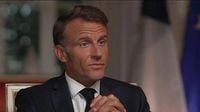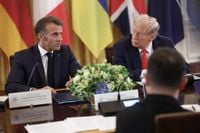On Monday, August 18, 2025, the White House became the epicenter of renewed international efforts to end the war in Ukraine, as U.S. President Donald Trump hosted a high-stakes, closed-door summit with Ukrainian President Volodymyr Zelenskyy and seven key European leaders. The gathering, which included British Prime Minister Keir Starmer, French President Emmanuel Macron, Italian Prime Minister Giorgia Meloni, German Chancellor Friedrich Merz, Finnish President Alexander Stubb, NATO Secretary General Mark Rutte, and European Commission head Ursula von der Leyen, was focused on hammering out security guarantees for Ukraine and exploring new diplomatic paths to peace.
According to Newsweek, the meeting came on the heels of Trump’s recent talks with Russian President Vladimir Putin in Anchorage, Alaska, just three days prior. Both Trump and Putin described the Alaska encounter as “extremely productive,” with Trump noting, “many points were agreed to,” but also cautioning, “there’s no deal until there’s a deal.” No formal agreement or signed deal emerged from their discussion, but Trump and his special presidential envoy, Steve Witkoff, claimed that Putin had agreed to allow U.S. and NATO forces to defend Ukraine should Moscow violate any potential peace arrangement.
Even as the world waited for tangible progress, the summit was marked by moments of candor and tension. A hot mic captured Trump whispering to Macron, “I think he [Putin] wants to make a deal. I think he wants to make a deal for me, you understand that? As crazy as it sounds,” reported the New York Post. The remark hinted at Trump’s belief in his unique capacity to broker peace, but also underscored the delicate dance of personalities and interests at play.
Following the White House deliberations, Trump announced he had called Putin to start preparing a direct meeting between Ukrainian and Russian leaders—a move to be followed by a trilateral session that would include Trump himself. According to Newsweek, Trump set a two-week timeline to determine whether diplomatic progress was possible, stating that both sides would soon know “whether or not we’re going to solve this or is this horrible fighting going to continue.”
Macron, for his part, did not mince words about the stakes. In an interview with NBC News after the summit, the French president warned that the global credibility of the United States and its NATO allies was “on the line in Ukraine.” He explained, “What’s happening in Ukraine is extremely important for Ukrainian people, obviously, but for the whole security of Europe, because we speak about containing a nuclear power, which decided just not to respect international borders anymore. And I think it’s very important for your country because it’s a matter of credibility. The way we will behave in Ukraine will be a test for our collective credibility in the rest of the world.”
While Macron welcomed Trump’s confidence in reaching a deal to end the war, he stressed that any agreement “must not be detrimental to Ukraine and Europe.” Macron elaborated, “All of us, we want a deal, and we want a peace deal. But we want to make sure that this peace, and so this deal, will be something which will allow the Ukrainians to recover their country and live in peace, to be sure the day after this peace deal that they will have sufficient deterrence power not to be attacked again, and to be sure—for the Europeans—that they will live in peace and security.”
Yet, skepticism lingered. Macron admitted, “When I look at the situation and the facts, I don’t see President Putin very willing to get peace now. But perhaps I’m too pessimistic.” He also insisted that robust security guarantees for Ukraine were non-negotiable: “If you make any peace deal without security guarantees, Russia will never respect its words, will never comply with its own commitments.” Macron signaled support for ramping up sanctions if Russia failed to engage seriously, declaring, “Yes, we have to increase the sanctions, secondary and primary sanctions, in order to increase the pressure on the Russians to do so.”
Meanwhile, European leaders prepared for a follow-up virtual meeting of the so-called “Coalition of the Willing” on Tuesday, August 19, to be co-chaired by Starmer and Macron, as confirmed by both the German government and the Élysée Palace. Swedish Prime Minister Ulf Kristersson, ahead of the debrief calls, emphasized, “The pressure on Russia must increase, and I emphasise this in every conversation.” Ursula von der Leyen, president of the European Commission, briefed European political group leaders on the results of the White House talks, with Ireland’s deputy prime minister Simon Harris noting the “important work in the days and the weeks ahead. There must be a just, lasting and enduring peace.”
Ukrainian President Zelenskyy, reflecting on the summit, confirmed that Ukraine and its allies were “already working on the concrete content of the security guarantees.” He added, “We will do everything to make the path to peace a reality – through partnership, through security guarantees, and through the courage of the Ukrainian people.”
But even as diplomatic gears turned, the violence on the ground continued unabated. According to Reuters, Ukraine’s air force reported that Russia launched 270 drones and 10 missiles overnight in one of its largest attacks this month, with strikes damaging energy infrastructure and causing power outages across the Poltava and Chernihiv regions. The mayor of Kremenchuk, Vitalii Maletskyi, called the attack a clear signal that “Putin does not want peace – he wants to destroy Ukraine.” Poltava governor Volodymyr Kohut confirmed damage to administrative buildings but reported no casualties, while nearly 1,500 residential and 119 commercial customers were left without power in the Lubny district.
Ukraine’s foreign minister Andrii Sybiha responded to the attacks by stressing the urgency of a breakthrough: “While hard work to advance peace was underway in Washington DC., led by Presidents Zelenskyy and Trump, with the participation of European and Nato leaders, Moscow continued to do the opposite of peace: more strikes and destruction.” Sybiha expressed hope that the future trilateral meeting between Trump, Zelenskyy, and Putin “can bring a breakthrough on the path to peace,” and extended gratitude to the United States and Trump for their peacemaking efforts.
As the world watches, the coming weeks are set to test not only the resolve of Ukraine and its allies but also the sincerity of Russia’s engagement. The stakes are enormous: not just for Ukrainians yearning for an end to destruction, but for the credibility of Western security guarantees and the broader international order. For now, all eyes remain fixed on the promised meetings and whether the hard-fought diplomatic momentum can translate into a just and lasting peace.


